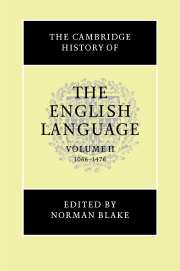1 - INTRODUCTION
Published online by Cambridge University Press: 28 March 2008
Summary
Beginnings of the study of Middle English
Traditionally, the start of Middle English is dated in 1066 with the Norman Conquest and its finish in 1485 with the accession of Henry VII, the first Tudor monarch. Both dates are political and historical, and the events they represent may have an impact on the development of the English language in the longer term but they are hardly appropriate as guides to the dating of periods in it. In any case language does not change as abruptly as such stark dates would suggest and the whole matter of when Middle English began and ended depends on the features which are regarded as significant in marking a change in the language. The period is called ‘Middle’ English because it falls between Old and Modern English. To most people today Middle English has seemed closer to Modern than to Old English for a variety of reasons. Perhaps the most important of these has been the influence of Geoffrey Chaucer. His reputation as the ‘Father of English Poetry’ has meant that many people have some familiarity with Middle English through his writings. More importantly, his work has been almost constantly available since Caxton issued the editio princeps of The Canterbury Tales in 1476. Each subsequent century has seen its great editor of Chaucer (Ruggiers 1984) and these editors have kept Chaucer and Middle English very much in the public eye. The only other author who comes anywhere near Chaucer in this respect is Malory, whose Le Morte Darthur was published several times in the sixteenth and nineteenth centuries.
- Type
- Chapter
- Information
- The Cambridge History of the English Language , pp. 1 - 22Publisher: Cambridge University PressPrint publication year: 1992
- 8
- Cited by



